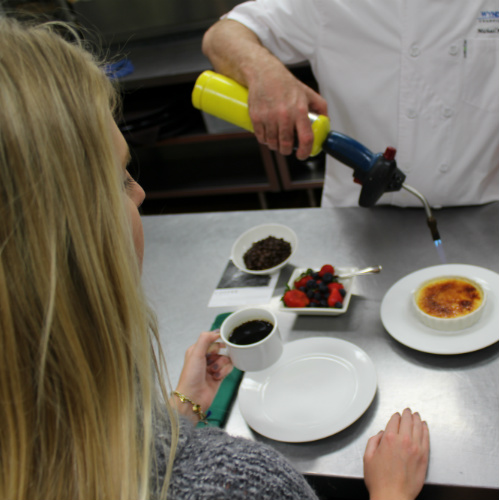
Whether it’s a cup of coffee or an intimate in-kitchen dinner, McConnell Golf’s culinary innovations are hitting all the right notes.
Premium Coffee
When Raleigh Coffee Company wanted to upgrade the quality of its coffee, they knew just where to turn. “Today, anybody can get a coffee roaster, get their hands on decent coffee beans, and roast them up. We wanted to take an extra step and be more genuine,” says Raleigh Coffee Company Owner Joseph Bland. That meant illuminating the face behind the bean — since September, all coffee served at McConnell Golf clubs comes from the same source, Leonel Vindas’ Costa Rican farm. “Through this single-source farming, we’re able to guarantee consistent flavors to members and also consistent business and support for Leonel’s estate,” Bland says.
Raleigh Coffee Company has sourced McConnell Golf coffee for a few years, always with an emphasis on quality. Only in the past year has Bland begun partnering specific farmers to specific accounts. “McConnell Golf is about networking and connection. They’re building their community across the region and three states, and we knew this would be the right program to introduce.”
Single-sourced coffee stands out for its commitment to a particular farmer. In tropical coffee-growing regions, many farmers struggle to make ends meet. Even the fair-trade market is crowded; to keep up, growers have to produce “mediocre coffee,” Bland says, in order to meet demand. The assurance of a large account — like that of a set of country clubs — gives a farmer peace of mind. In turn, Leonel Vindas is empowered to focus on growing practices that result in a premium crop.
“We’re putting people over profit,” Bland says. “It’s just coffee, but many people do consume it every day. For us, it’s about transparency and knowing where your food comes from.” It’s a committed attention to detail perfectly suited to McConnell Golf clubs.
Wine and Dine
Joseph Bland likens the coffee sourced from Leonel Vindas to fine wine: “A small producer farm is much like an independent winery or vineyard,” he explains. “These are your small, family-owned plots committed to quality rather than quantity.”
At the Country Club of Asheville, members enjoy tastes of fine wine alongside gourmet paired bites at Chef Bruce McIntosh’s dinners. It’s a more informal take on the same attention to detail behind McConnell Golf’s single-source coffee: chef-led cooking demos. “I call them demos instead of classes,” Chef Bruce explains. “I prepare the food in front of members, so they can see what I’m doing and learn from it, but then it’s plated for them to enjoy.”
The dinners began by happenstance and as an extension of the club community. Chef Bruce knew a group of men at the club who wanted to have a special celebratory dinner on Tuesday nights, when dinner service is closed. To make the meal memorable, he thought to utilize the club’s spacious kitchen outfitted with a large wooden block table. Members sat around the table, and Chef Bruce made every course to order right there in the kitchen.
The evening was a success, and the men raved about it enough to spread the word. Soon, another group wanted a private kitchen dinner, and then another. Chef Bruce decided to make it a regular occurrence. “But I wanted to take it a step further,” he says.
Now, demo dinners involve five or six small-plate-sized courses and shared bottles of wine. When they arrive, members receive a printout with the recipes for a few of the courses (never all of them, because “I like to keep an element of surprise for a few of the courses,” Chef Bruce says). There’s also a space to take notes on any tricks and techniques gleaned from watching the chef at work. Some members take ample notes and others sit back and enjoy — both are welcomed and encouraged. “It’s a real social event,” Chef Bruce says. Between the convivial gathering, the quality time with the chef, and the ability to recreate recipes at home, the dinners are truly something special. “We’re enjoying offering something different to our members.”